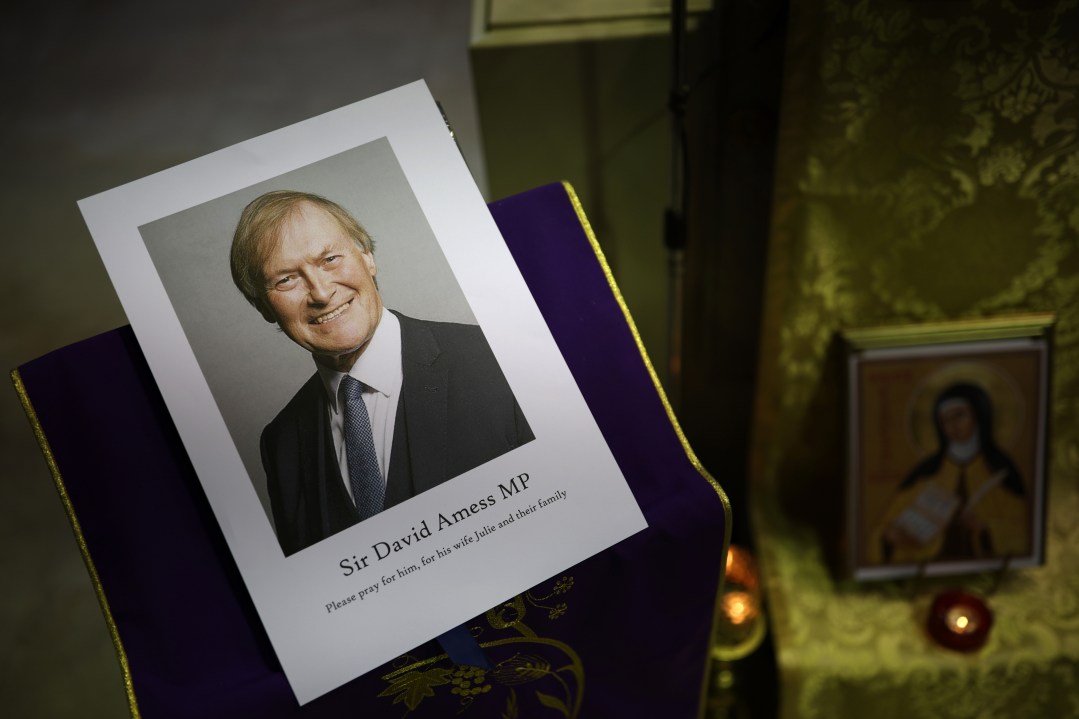Sir David Amess was killed in the line of duty. He was doing one of the most important – and vulnerable – parts of an MP’s job, and he was killed while doing it. Most of the week, MPs go to work in a palace under armed guard. They live in houses with CCTV, panic alarms and rapid police response mechanisms in case of trouble. These measures have gradually been added to their lives as the perceived threat has increased. But in just over a decade, three serious attacks against MPs have taken place in the one place where they lack such security: their constituency surgeries.
Stephen Timms was stabbed at his surgery in 2010. Jo Cox was murdered leaving hers five years ago. Today, Amess was killed at his. After each attack, the political world has asked whether there needs to be more protection for MPs. Largely, those remaining and grieving their colleagues tend to answer that there can’t be. Timms himself was holding surgeries three weeks after he was attacked. He said the first one back was ‘a bit odd’, but refused permanent security measures such as a knife scanning arch because he didn’t want people to think he didn’t trust them. In his words:
That would change the way we relate to our constituents. I didn’t want people to have to be scanned every time they walked into my surgery.
Some have been told that their cat flap is a risk because someone could throw acid or a petrol bomb through it
Timms told me this on 17 June 2016 when I sat in on his surgery. It was the day after Cox had died, and he had been determined to go ahead and honour a longstanding commitment to have me sit in and watch, as I was researching the relationship MPs have with their constituents at the time. He dealt with a leaky roof and a sobbing constituent in that session. Amess had the same reaction to Cox’s death, arguing that something would be lost if MPs accepted too many security barriers between them and their constituents.
Instead, most made tweaks where the police checked out the venue first and they never met people alone. But they were small changes that recognised the vulnerability of their job, and largely accepted it.
I asked two MPs last weekend whether they felt scared doing their surgeries. Both replied that they had on occasion, but that they didn’t want that to get in the way of the vast bulk of their interactions. As an observer of these things, it seems to me that MPs have become used to a life that isn’t normal, and not in the insulting sense that most people would say that. They have become used to having stalkers – Amess himself had mentioned people causing trouble outside his own home. They have become used to knowing that the location of their homes are well-known locally. They have become used to assessments of both the place they stay in when they’re in London, and of their constituency home. Some have been told that their cat flap is a risk because someone could throw acid or a petrol bomb through it. They are accustomed to death threats.
Perhaps the thing that makes them so acclimatised to all these extraordinary ways of living is the stuff that isn’t an outright threat, but is just part of the climate. The hostility, the insults, the harassment. It’s what people name above anything else when they cite the reasons for not going into politics. It’s what politicians who leave the field tend to cite too.
There has been a normalisation of hatred towards MPs that makes all the dangerous stuff seem inevitable. So inevitable, in fact, that people considering going into politics now don’t just have to count the potential personal costs, or the pay cut they might take. It means they also have to consider that they have a risk of being killed.







Comments